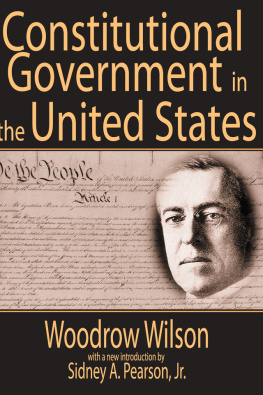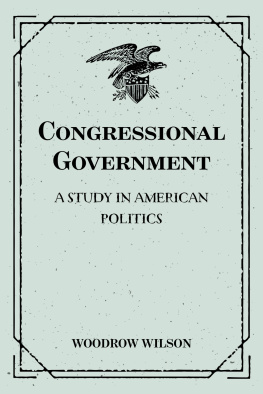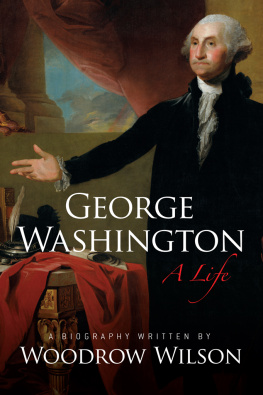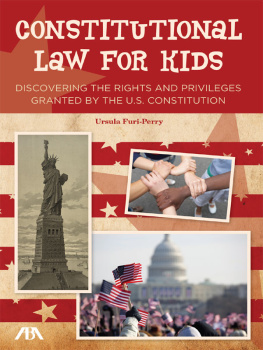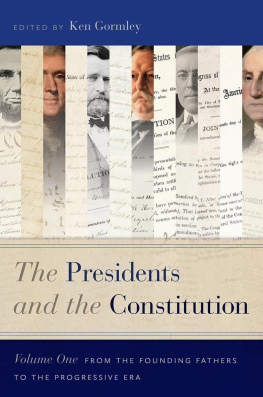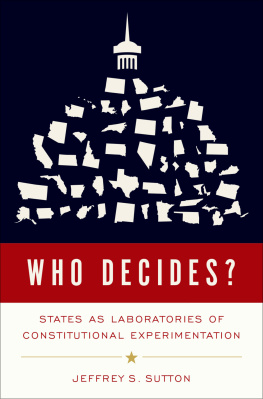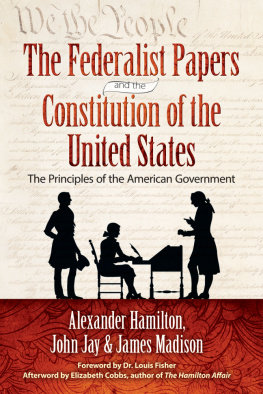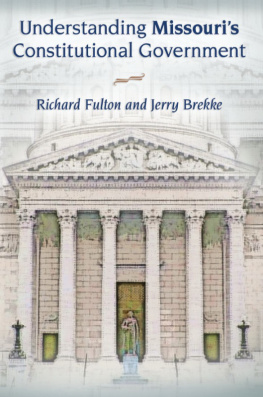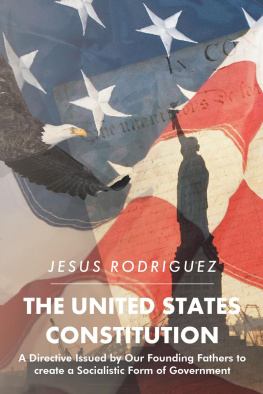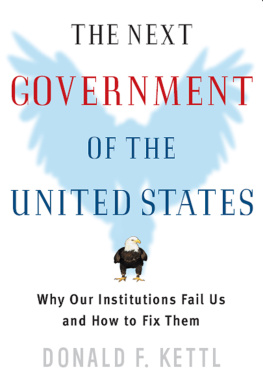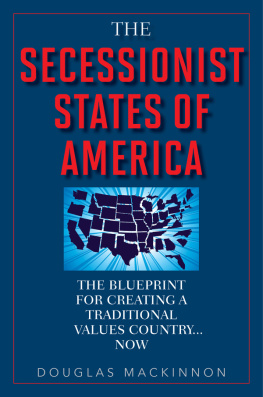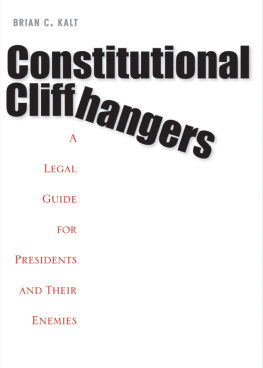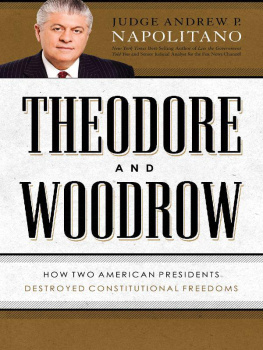Constitutional government in the United States
Library of Liberal Thought
sthetic
Benedetto Croce
translated by Douglas Ainslie
Changing Disciplines
John A. Ryle
Constitutional Government in the United States
Woodrow Wilson
with a new introduction by Sidney A. Pearson, Jr.
The Correspondence of John Stuart Mill and Augusts Comte
Oscar A. Haac, editor
Dominations and Powers
George Santayana
Henry Adams
Elizabeth Stevenson
New Deal Days: 1933-1934
Eli Ginzberg
Peace and War
Robert A. Rubinstein and Mary LeCron Foster, editors
Politics and Religious Consciousness in America
George Armstrong Kelly
Quest for Equality in Freedom
Francis M. Wilhoit
Thomas Jefferson
Max Lemer
Tocqueville and American Civilization
Max Lerner
Toward a New Enlightenment
Paul Kurtz
The Transatlantic Persuasion
Robert Kelley
True Tolerance
Jay Budziszewski
The Voegelinian Revolution
Ellis Sandoz
with a new introduction and epilogue by the author
Constitutional Government in the United States
Woodrow Wilson
with a new introduction by Sidney A. Pearson, Jr.
Originally published in 1908 by Columbia University Press
Published 2002 by Transaction Publishers
Published 2017 by Routledge
2 Park Square, Milton Park, Abingdon, Oxon OX14 4RN
711 Third Avenue, New York, NY 10017, USA
Routledge is an imprint of the Taylor & Francis Group, an informa business
New material this edition Copyright 2002 by Taylor & Francis.
All rights reserved. No part of this book may be reprinted or reproduced or utilised in any form or by any electronic, mechanical, or other means, now known or hereafter invented, including photocopying and recording, or in any information storage or retrieval system, without permission in writing from the publishers.
Notice:
Product or corporate names may be trademarks or registered trademarks, and are used only for identification and explanation without intent to infringe.
Library of Congress Catalog Number: 2001034714
Library of Congress Cataloging-in-Publication Data
Wilson, Woodrow, 1856-1924.
Constitutional government in the United States / Woodrow Wilson ; with a new introduction by Sidney A. Pearson, Jr.
p. cm.
Originally published: New York : Columbia University Press, 1908.
Includes bibliographical references (p. ) and index.
ISBN 0-7658-0866-8 (pbk. : alk.paper)
1. United StatesPolitics and government. 2. Constitutional lawUnited States. I. Title.
JK246 .W82 2001
320.473dc21
2001034714
ISBN 13: 978-0-7658-0866-0 (pbk)
Prefatory Note
THESE lectures are not intended as a systematic discussion of the character and operation of the government of the United States. They are intended merely to present it in some of its more salient features from a fresh point of view and in the light of a fresh analysis of the character and operation of constitutional government. It is hoped that they will be thought, for this reason, to be serviceable in the clarification of our views as to policy and practice.
WOODROW WILSON.
PRINCETON, NEW JERSEY,
March 24 , 1908.
Reinterpreting the Constitution for a New ERA: Woodrow Wilson and the Liberal Progressive Science of Politics
WOODROW Wilson's Constitutional Government in the United States is one of the genuine classics of American government. It is among the most subtle and influential criticisms of the American founding produced during the Progressive Movement. It has kept its well-deserved status as a classic for at least two related reasons. First, because it struck a responsive chord among Progressive Era reformers at the time it first appeared. Second, because it has become the paradigmatic "living Constitution" school or tradition of American constitutional government. The Wilsonian interpretation of the Constitution so overwhelmed the political science of the founders that it has never fully recovered among scholars and students of American politics in general. If Wilson had never been elected president a mere four years after its publication, he would still be remembered among students of American government as one of the foremost Liberal interpreters of the Constitution. Or perhaps one should more accurately say "reinterpreter," because Constitutional Government should be read as the culmination of Wilson's own political thought as well as the foundation of the modern Liberal critique
The study of Wilson's science of politics in Constitutional Government begins with the observation that it is a very different genre of political writing than that of The Federalist the preeminent source for interpreting the founders' political science. The Federalist may be said to confirm Spinoza's dictum "there can be no doubt, that statesmen have written about politics far more happily than philosophers. For, as they have had experience for their mistress, they taught nothing that was incompatible with practice." It was to be a science based, as Hamilton noted, "on reflection and choice" ( Fed 1).
It was Wilson's explicit intention to replace the constitutional argument of the founders with one of his own and, in effect, to refound the American regime on principles he thought were more scientific than those of "the new science." It is in this sense that Wilson may be described as one of the founders of the new science of American politics: a Progressive-Liberal paradigm of constitutional democracy. It was a development that found its most mature expression in Constitutional Government, but it began, as has been oft noted, with an undergraduate essay Wilson wrote as an undergraduate at Princeton entitled "Cabinet Government." The ideas were borrowed from Walter Bagehot's influential The English Constitution (1867 and 1872). What Wilson learned from Bagehot was the value of unified political power for the accomplishment of policy-oriented government. It was this perspective that brought him into conflict with the founders' constitutional system and its separation of powers that weakened party cohesion and divided responsibility for policy outcomes. That same fundamental criticism of the founders' science of politics carried through in his doctoral dissertation at Johns Hopkins University published as Congressional Government (1885). It was a fundamental argument he never completely abandoned.
What he did not provide was a philosophic understanding of what had caused that rupture between the Founders' theory and modern practice. It was Constitutional Government that provided such an explanation and the Wilsonian solution to the founders' inadequacies.
The Argument and the Action of Constitutional Government
At the heart of Wilson's argument and analysis in Constitutional Government is his definition of the term "constitution." He was at least partly aware that one of the defects of Congressional Government was the failure to define what he meant by a constitution. That failure to define his terms meant, in turn, a confused and conflicting criticism of the Founders. Why, for example, did the intentions of the founders break down in the actual operation of government? His answer was that it was a failure of theory at the deepest level of political analysis. The founders, for all of their undisputed brilliance, had misunderstood the nature of government itself. Their political science was not up to the task of providing guidance for a modern democracy.

